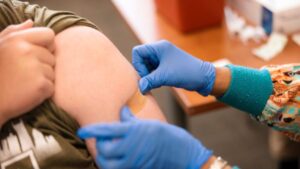The U.S. is expanding COVID-19 boosters, ruling that 16- and 17-year-olds can get a third dose of Pfizer’s vaccine.
The U.S. and many other nations already were urging adults to get booster shots to pump up immunity that can wane months after vaccination, calls that intensified with the discovery of the worrisome new omicron variant.
On Thursday, the Food and Drug Administration gave emergency authorization for 16- and 17-year-olds to get a third dose of the vaccine made by Pfizer and its partner BioNTech — if it’s been six months since their last shot.
“Vaccination and getting a booster when eligible, along with other preventive measures like masking and avoiding large crowds and poorly ventilated spaces, remain our most effective methods for fighting COVID-19,” Dr. Janet Woodcock, acting FDA commissioner, said in a statement.
What to know
Long Island marked its worst COVID-19 positivity level in nearly a year, surpassing 6%, and logged nearly 1,800 new cases on Tuesday.
Medical experts are calling for a change in policies in Nassau and Suffolk as case numbers and positivity levels soar nearly two years into the pandemic.
Eight more cases of omicron were detected in the state, with six in New York City and one in Westchester.
There’s one more step: The Centers for Disease Control and Prevention must formally recommend the boosters for this age group and a decision is expected soon.
The Pfizer vaccine is the only option in the U.S. for anyone younger than 18, either for initial vaccination or for use as a booster. It’s not yet clear if or when teens younger than 16 might need a third Pfizer dose.
“The booster vaccination increases the level of immunity and dramatically improves protection against COVID-19 in all age groups studied so far,” BioNTech CEO Ugur Sahin said in a statement.
Vaccinations for children as young as 5 just began last month, using special low-dose Pfizer shots. By this week, about 5 million 5- to 11-year-olds had gotten a first dose.
The extra-contagious delta variant is causing nearly all COVID-19 infections in the U.S., and in much of the world. It’s not yet clear how vaccines will hold up against the new and markedly different omicron mutant. But there’s strong evidence that boosters offer a jump in protection against delta-caused infections, currently the biggest threat.
Complicating the decision to extend boosters to 16- and 17-year-olds is that the Pfizer shot — and a similar vaccine made by Moderna — have been linked to a rare side effect. Called myocarditis, it’s a type of heart inflammation seen mostly in younger men and teen boys.
The FDA said rising COVID-19 cases in the U.S. mean the benefits of boosters greatly outweighed the potential risk from the rare side effect, especially as the coronavirus itself can cause more serious heart inflammation.
Health officials in Israel, which already gives boosters to teens, have said the side effect continues to be rare with third doses.
A U.S. study this week offered additional reassurance. Researchers from children’s hospitals around the country checked medical records and found the rare side effect usually is mild and people recover quickly. The research was published Monday in the journal Circulation.
Sign up to get text alerts about COVID-19 and other topics at newsday.com/text.



















